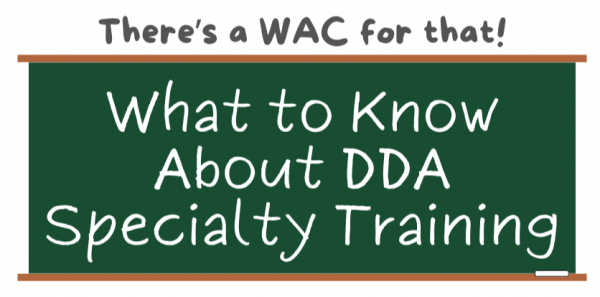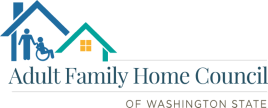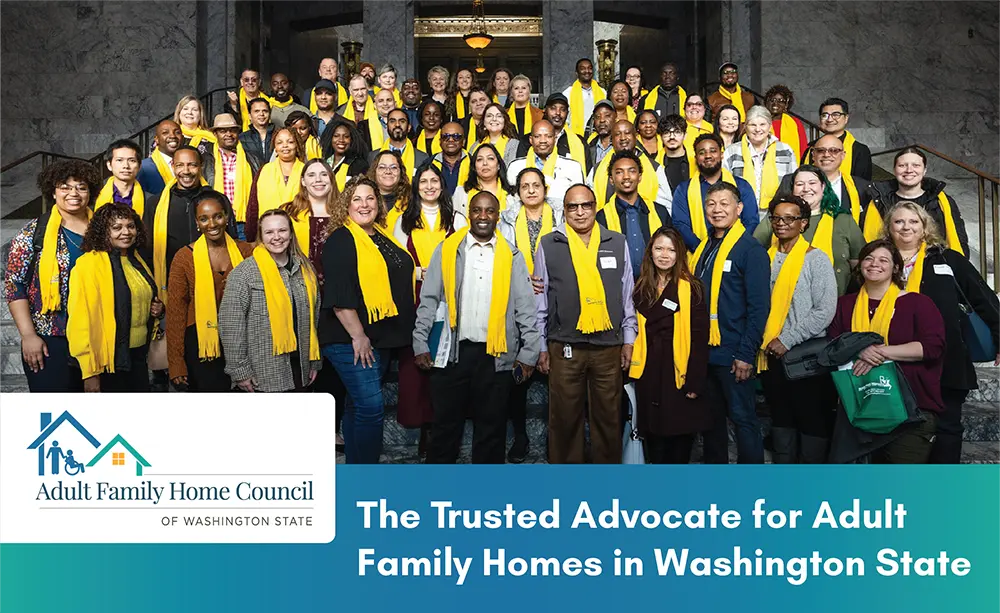
There's a WAC for That!
What to Know About DDA Specialty Training
A large number of calls this week were related to the Developmental Disabilities Administration (DDA) training and DD Specialty Certificates.
To take the DD Specialty Class you MUST sign up for training (you or staff) by your DSHS Region (1, 2, or 3), and can only access classes in your region. You can find the list of available trainings on the DDA Specialty Training Calendar.
Please remember that if you are adding a specialty to your license you will need submit an Adult Family Home Information Changes form (DSHS form #10-585).
Related WACs
WAC 388-112A-0400
What is specialty training and who is required to take it?
(1) Specialty training refers to approved curricula that meets the requirements of RCW 18.20.270 and 70.128.230 to provide basic core knowledge and skills to effectively and safely provide care to residents living with mental illness, dementia, or developmental disabilities.
(2) Specialty training classes are different for each population served and are not interchangeable. Specialty training curriculum must be DSHS developed, as described in WAC 388-112A-0010 (36), or DSHS approved.
(a) In order for DSHS to approve a curriculum as a specialty training class, the class must use the competencies and learning objectives in WAC 388-112A-0430, 388-112A-0440, or 388-112A-0450.
(b) Training entities must not use classes approved as alternative curriculum for specialty training that are not using the competencies and learning objectives in WAC 388-112A-0430, 388-112A-0440, or 388-112A-0450 to meet the specialty training requirement.
(c) Curricula approved as specialty training may be integrated with basic training if the complete content of each training is included.
(3) Assisted living facility administrators or their designees, enhanced services facility administrators or their designees, adult family home applicants or providers, resident managers, and entity representatives who are affiliated with homes that service residents who have special needs, including developmental disabilities, dementia, or mental health, must take one or more of the following specialty training curricula:
(a) Developmental disabilities specialty training as described in WAC 388-112A-0420;
(b) Dementia specialty training as described in WAC 388-112A-0440;
(c) Mental health specialty training as described in WAC 388-112A-0450.
(4) All long-term care workers including those exempt from basic training who work in an assisted living facility, enhanced services facility, or adult family home who serve residents with the special needs described in subsection (3) of this section, must take a class approved as specialty training. The specialty training applies to the type of residents served by the home as follows:
(a) Developmental disabilities specialty training as described in WAC 388-112A-0420;
(b) Dementia specialty training as described in WAC 388-112A-0440; and
(c) Mental health specialty training as described in WAC 388-112A-0450.
(5) Specialty training may be used to meet the requirements for the basic training population specific component if completed within 120 days of the date of hire.
(6) For long-term care workers who have completed the 75-hour training and do not have a specialty training certificate that indicates completion and competency testing, the long-term care worker must complete specialty training when employed by the adult family home, enhanced services facility, or assisted living facility that serves residents with special needs.
WAC 388-76-10146
Qualifications—Training and home care aide certification.
(1) The adult family home must ensure staff persons hired before January 7, 2012 meet training requirements in effect on the date hired, including requirements in chapter 388-112A WAC.
(2) The adult family home must ensure all adult family home caregivers, entity representatives, and resident managers hired on or after January 7, 2012, meet the long-term care worker training requirements of chapter 388-112A WAC, including but not limited to:
(a) Orientation and safety;
(b) Basic;
(c) Specialty for dementia, mental illness and/or developmental disabilities when serving residents with any of those primary special needs;
(d) Cardiopulmonary resuscitation and first aid; and
(e) Continuing education.
(3) All persons listed in subsection (2) of this section, must obtain the home-care aide certification if required by this section or chapters 246-980 or 388-112A WAC.
(a) Until March 1, 2016, a provisional home-care aide certification may be issued by the department of health to a long-term care worker who is limited English proficient.
(4) Even if an adult family home applicant does not intend to provide direct personal care, the applicant must meet the long-term care worker training and home-care aide certification requirements under chapter 388-112A WAC to the same extent that the requirements would apply if the applicant was a long-term care worker.
(5) Under RCW 18.88B.041 and chapter 246-980 WAC, certain individuals, including registered nurses, licensed practical nurses, certified nursing assistants or persons who are in an approved certified nursing assistant program, are exempt from home-care aide certification and long-term care worker training requirements. This exemption does not apply to continuing education; these individuals must comply with continuing education requirements under chapter 388-112A WAC.
(6) The adult family home must ensure that all staff receive the orientation and training necessary to perform their job duties.
Not a Member Yet?
Membership fees enable the Council to cover legal expenses and fund staff to advocate with the state and regulatory agencies. The participation of every adult family home is vital to ensuring fair regulations and rates that accurately reflect the costs of caring for our vulnerable adults. Consider becoming a member of the Council to help us continue improving conditions for all adult family homes in Washington State.

